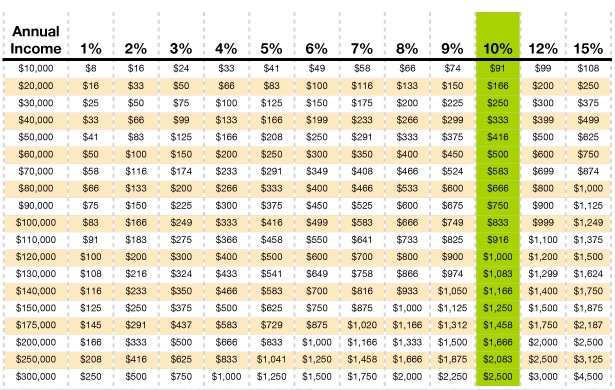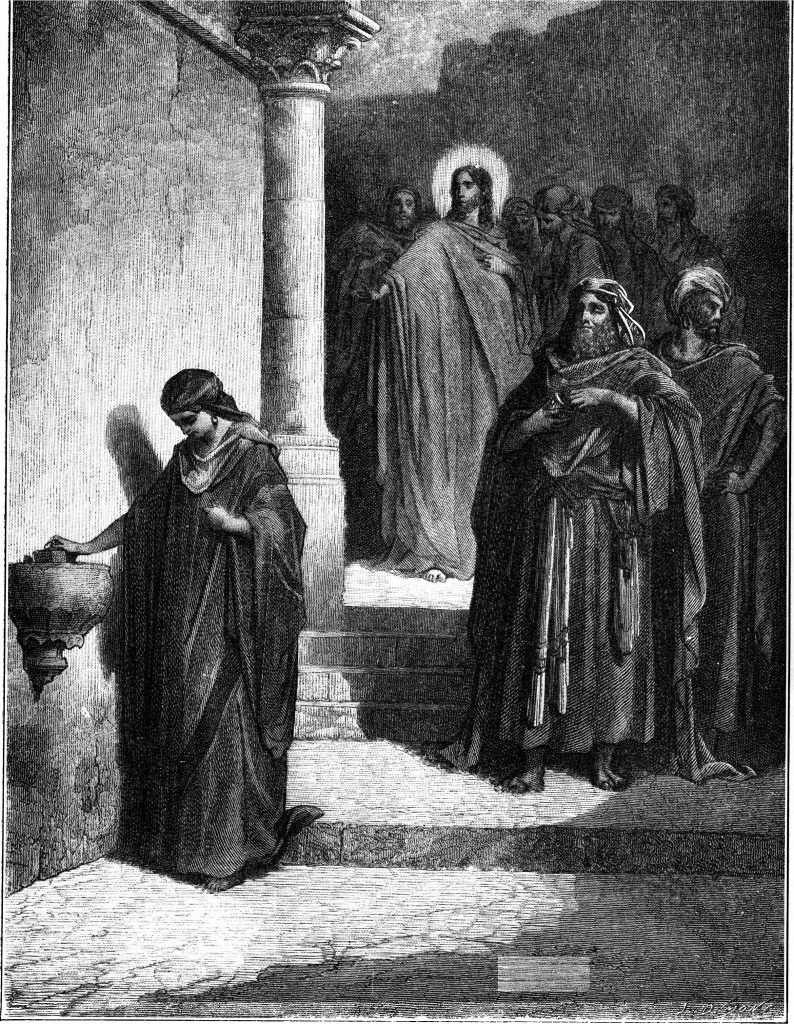Last November, I was challenged by a leader in the Divine Renovation Network, the group that coaches us: ‘Father Justin, how often do you preach on money?’ ‘In ten years, I’ve only asked twice for an increase in giving. God has taken care of us and the people are so generous that I haven’t had to ask much.’ He replied, ‘Ah, you’ve got it all backwards. People have a greater need to give than to receive. For me and my wife, if you don’t show us a good opportunity to give at your parish, we’ll give elsewhere.’ In that moment, my mind was changed: We all have a greater need to give than to receive.
Today’s Second Reading is about St. Paul’s raising money for poor Christians in Jerusalem, and we’re going to focus on giving today. But, it occurred to me that I haven’t even preached much about service in general (such as service to the poor) because I’ve observed that, when I speak about service, a number of people zone out. Remember how I told a man that his wife sleeps during my homilies? He said, ‘No, Father, she’s agreeing with you. She’s saying, ‘Yes, Father, yes!’” So, based on the principle of having a greater need to give, I’ve been doing you a disservice. Today is the final homily in a four-part series on reversal of expectations.
Let’s meditate on the Second Reading in five parts. 1) “Brothers and sisters: Now as you excel in everything — in faith, in speech, in knowledge, in utmost eagerness, and in our love for you — so we want you to excel also in this generous undertaking” (2 Cor 8:7). The year is 55 A.D, and the Jerusalem church is in poverty because of famine, heavy taxation, and Christians being socially penalized.
So, for a few years, St. Paul had been asking wealthier Greek Christians to help. He notes that the Corinthians are already virtuous, but Paul wants to make sure that they don’t over-spiritualize their faith. Sometimes, there are Christians who pray for the poor, the preborn, etc., but don’t do anything practical to help. St. Paul wants the Corinthians to be completely virtuous: giving is for their good.
2) “I do not say this as a command, but I am testing the genuineness of your love against the earnestness of others” (8:8). You can’t command people to give freely—that’s a contradiction. Yet Paul does see the Corinthians’ generosity as a test of love, and he compares them to the Macedonian Christians who are less wealthy than the Corinthians but have been more generous.
3) “For you know the generous act of our Lord Jesus Christ, that though he was rich, yet for your sakes he became poor so that by his poverty you might become rich” (8:9). Jesus is the model: Though He’s ‘rich,’ meaning He’s God, He ‘became poor’ for our sakes, that is, became human. If the Corinthians have become spiritually rich through Jesus’ poverty, they should do the same for others.
4) “In this matter I am giving my advice: it is appropriate for you who began last year not only to do something but even to desire to do something — now finish doing it, so that your eagerness may be matched by completing it… For if the eagerness is there, the gift is acceptable according to what one has” (8:10-12). The Corinthians had started raising funds the previous year, and St. Paul doesn’t focus on their failure to complete it, rather he focuses on their initial eagerness! So, we need both the willingness to imitate Jesus, but also the completion, and whatever we give according to our means is acceptable.
5) “I do not mean that there should be relief for others and pressure on you, but it is a question of a fair balance between your present abundance and their need, so that their abundance may be for your need, in order that there may be a fair balance” (8:13-14). ‘Fair balance’ is the key: We don’t have to give to the point that we’re destitute. Rather, if we’re well-off right now, we can help others; later on, if we’re in need, they can help us.
Do you remember the video we showed of Eric Mahl? He was in the NFL but living for himself. He wasn’t doing anything overtly bad but he gave life to no one, and he was made for more.
- Eric Mahl
- Source: themiscellaney.org
He felt a greater need to give than to receive, because, when we remember what Jesus has done for us, how we’ve received everything from Him, His whole self in His death and Resurrection, as well as the gift of the Holy Spirit, we’re just overflowing with love!
Vatican Council II famously wrote, “Man… cannot fully find himself except through a sincere gift of himself” (Gaudium et Spes, 22). Why? Because we’re made in Jesus’ image. When we’re selfish and lazy, we lose ourselves. When we give life to others, we become who we were meant to be.
One person here has asked me for over a year to share the following: “St. Anthony of Padua is the patron saint who helps us find lost things. I was lost and he showed me the way to find Jesus. The pandemic had a silver lining because I had to register for a parish to attend mass. St. Anthony Parish deepened my faith and the only way I could pay it forward is by helping in building the parish centre. I have stopped donating to other charitable institutions, informing them that this is temporary because our parish needs the funds. Today, my monthly donation for our parish centre has increased and I wish that you all can do the same.” Why did she do this and why did she ask me several times to share this message? Because she has a need to give.
So, here are three points to consider: 1) Sacrificial Giving: We’ve talked about this for ten years now: When we give of our time, talent, or treasure, it should hurt. If I have a ten and a twenty dollar bill in my wallet and want to give, I give the bill that stretches me—that means it’s sacrificial.
Three years ago, we talked about percentage giving, and here’s a chart that some churches use:
The left-hand column is our annual income while the rest is our weekly percentage of giving. Furthermore, while the woman just mentioned focused on giving to the Parish Centre, it’s your choice. It can be to anything God wants us to give.
Please remember, if we’re young, as soon as we have an allowance or salary, we should give. That’s what we learn from Jesus’ observation of the poor widow, who gave all she had to the Temple.
2) Today, I’m not asking for an increase in giving. One thing we do is focusing our fundraising efforts, talk about it less for greater impact . For the Parish Center, we put all our efforts into the November Dinner & Dance.
For the spiritual growth of the parish, from now on, we’re going to talk about an increase of giving every Lent. That’s why we’re giving out the percentage giving cards today, so that we have many months to pray over it.
Finally, to help the archdiocese, we have Project Advance in May.
3) We mentioned on Easter Sunday that we’re in a deficit budget. And I mentioned that these donors said, ‘We love what St. Anthony’s is doing… But, Fr. Justin, tell your people that you don’t just want to run a $200,000 deficit, but a $500,000 deficit!’ You know that I’m not actually pushing the deficit further, right? You know I’m not crazy, right? That’s just a way of saying we love to grow! Anyway, thanks to God, your generosity, the generosity of a few donors in our parish, and the reduction of our expenditures, we have enough money to make it to the end of the year. However, to maintain our spiritual growth, we will ask for an increase in giving in Lent.
Next week, we’ll talk about our genuine need to receive. However, for now, to be like Jesus and to find ourselves, we try to live out the principle that we have a greater need to give than to receive.






